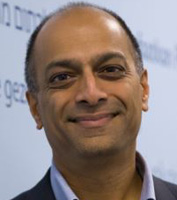Rare Disease Trials Require Patient Insights And Input

By Ed Miseta, Chief Editor, Clinical Leader

On October 15-16, 2018, more than 700 rare disease experts will gather in Washington, D.C. for the NORD Rare Diseases and Orphan Products Breakthrough Summit. During this event, Dr. Pushkal Garg, Chief Medical Officer at Alnylam Pharmaceuticals, will discuss new approaches to patient-centric drug development during the panel discussion “How Patients Are Helping Drive Research and Drug Development.”
Alnylam was founded approximately 16 years ago and is focused on developing RNAi therapeutics for patients with rare diseases. At Alnylam, Garg is leading the effort to help patients. Alnylam’s ongoing commitment to rare diseases is the catalyst for Garg’s participation at the NORD summit and reflects his personal passion for collaborating with patients and advocacy organizations to help drive drug development.
 Alnylam’s lead program, ONPATTRO, was recently approved in both the U.S. and Europe for the rare disease hereditary ATTR amyloidosis with polyneuropathy. Patients treated with the therapy have experienced halting of the relentless progression of this disease, which is typically seen in untreated patients. Some patients have even demonstrated evidence of reversal of neuropathic impairment.
Alnylam’s lead program, ONPATTRO, was recently approved in both the U.S. and Europe for the rare disease hereditary ATTR amyloidosis with polyneuropathy. Patients treated with the therapy have experienced halting of the relentless progression of this disease, which is typically seen in untreated patients. Some patients have even demonstrated evidence of reversal of neuropathic impairment.
Alnylam also recently announced topline results from the interim analysis of its Phase 3 ENVISION study of givosiran for the treatment of acute hepatic porphyrias (AHPs). These are a family of rare, genetic diseases characterized by potentially life-threatening attacks, and for many patients, chronic debilitating symptoms that negatively impact daily functioning and quality of life. The disabling disorder is often misdiagnosed or remains undiagnosed for an average of 15 years.
Earlier this year, Alnylam’s lumasiran – a potential treatment for the rare disease primary hyperoxaluria, which can lead to kidney failure as well as debilitating and often fatal heart, and bone issues – received Breakthrough Therapy Designation by the U.S. FDA based on preliminary clinical evidence indicating that the drug may demonstrate substantial improvement on clinically significant endpoint(s) over available therapies.
Expertise Is An Issue
Oftentimes, patients with rare diseases suffer from a myriad of complex symptoms. Unfortunately, given this complexity, rare diseases are not well understood by most general physicians.
“With rare diseases, we do not have hundreds or thousands of physicians who are experienced in treating these diseases,” says Garg. “To bring forward meaningful advances for the care of these patients, we must personally speak and listen to them and aggressively integrate their insights. The recent focus on patient centricity, as well as The Voice of the Patient meetings hosted by the FDA, have become a critical component in meaningful drug development.”
The TTR amyloidosis Voice of the Patient meeting held a few years ago allowed Alnylam to learn which symptoms patients struggled with most in their daily lives. These insights help guide the company when defining relevant endpoints in the ongoing clinical trials of ONPATTRO, which can then help patients understand how they will benefit and be impacted by a treatment.
Rare Diseases Require Patient Insights
With some diseases, the industry has performed many trials and understands the condition, symptoms, and concerns of patients. That is not the case with most rare diseases, many of which have never even benefited from the learnings of a single clinical trial. With these diseases, it is even more critical for industry to listen to patients to fully understand their condition and concerns.
“We should always prioritize listening to patients and their caregivers, especially when the medical community has limited experience with certain rare diseases,” says Garg. “In many cases, these patients are the only ones who can provide insights and observations that will help sponsors develop the right therapeutic that can make a meaningful difference in their lives. However, it’s of equal importance that we act with urgency as many of these patients are fighting a life-threatening illness without any form of treatment.”
Garg notes patient advocacy groups are also critical in helping healthcare companies hear the voice of patients throughout the drug development cycle. The company has an active patient advocacy engagement team, which builds connections between patient advocacy groups and team members across clinical development, medical affairs functions as well as other groups within the company.
Recruitment Is Still An Issue
Patient recruitment remains a prominent issue today as it was 20 years ago. Getting more patients to participate in trials will mean simplifying the requirements to participate. Obtaining patient feedback will be critical to improving this process, and these insights can only come from patients themselves.
“Our patient recruitment and retention group at Alnylam is currently soliciting patient perspectives prior to the launch of any new studies,” adds Garg. “We are incorporating these perspectives into the study design, informed consent process, and other aspects of the trial. We will share more details about this program during the NORD summit.”
Helping patients learn about new therapies and gain access to them is another effort that can help patients with rare diseases. With the launch of ONPATTRO, Alnylam now has an active patient services organization to help with that process. Through its central support hub Alnylam Assist, Alnylam will help patients minimize the hurdles and challenges that they must navigate when attempting to access ONPATTRO. Alnylam Assist also helps with navigating the complexity of coordinate insurance reimbursement and can connect patients with infusion centers, when intravenously infused therapies are being used.
“We recognize there are a lot of challenges that patients face in our healthcare system,” states Garg. “By putting this patient services hub together, Alnylam is attempting to reduce the burden for patients so they can get the care they need as quickly and efficiently as possible.”
The NORD Rare Diseases & Orphan Products Summit will be held on October 15-16, 2018 in Washington, D.C. Click here for more information.
